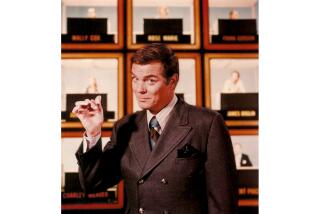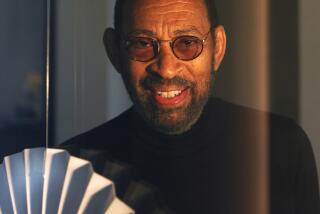Sammy Davis Jr. Dies : Cancer Kills Versatile Entertainer
- Share via
Sammy Davis Jr., the quintessential showman embraced by his peers as “Mr. Entertainment” for his enormous talent and versatility, died this morning at his home in Beverly Hills, losing a nine-month battle with throat cancer.
Death came at 5:59 a.m. as friends and fans of the diminutive, 64-year-old entertainer maintained a vigil outside the home. They had gathered there on Tuesday, when word first came that the end was near.
Ever since a tumor was discovered last September, fans had deluged him with letters, and show-business friends such as Frank Sinatra and Bill Cosby had rallied to his side.
Their tributes followed quickly:
“Guess they must need a good show up in Heaven, that’s all I can say,” said longtime friend Joey Bishop, who along with Sinatra, Dean Martin and Peter Lawford formed the core of Hollywood’s fast-living “Rat Pack” during the 1960s.
“God I’m sorry,” Bishop added. “I loved him.”
Martin hailed Davis as a great entertainer and “an even greater friend, not only to me, but to everyone whose life he touched.”
The affection for the man who described himself as a “little one-eyed colored guy” was evident earlier this year during a television tribute to his more than six decades in show business.
Whether dancing with his father and uncle on countless television guest spots, captivating movie audiences as Sportin’ Life in “Porgy and Bess,” singing his way through “Mr. Wonderful” on Broadway or finding a hit and a theme in “Candy Man,” Davis brought an exuberance to every performance.
But for much of his life, he was a man at war with himself.
He buried his pain in alcohol and cocaine, and he had to fight his way through what he called “the tortures of the damned” before he could return to dance again and charm movie fans in the 1989 film “Tap.”
Born Dec. 8, 1925, in Harlem, N.Y., where his father danced and his mother sang in a vaudeville troupe, little Sammy made his stage debut at the age of 3 and his film debut four years later.
Davis’ family often could not find hotels that would accept blacks, but it was not until he was drafted into the Army’s first integrated unit at 18 that he ran into naked racism.
During basic training, he said he was beaten, kicked and spat upon by whites in his barracks. The pain motivated him to pump even more energy into his performances at camp shows, believing that his talent could force acceptance.
After the war, the young singer-dancer increased his repertoire--adding trumpet, drums, celebrity impressions--and in 1946, Metronome magazine named him “Most Outstanding New Personality.” His career soared, but it all nearly ended in a car crash that cost him his left eye in 1954.
Once out of the hospital, he was in even more demand. Moving between the stage, television, movies and the recording studio, Davis became one of the most popular entertainers of his generation.
After a brief marriage to dancer Loray White, Davis married Swedish actress May Britt in 1960. The couple divorced in 1968, and two years later Davis married dancer Altovise Gore.
Davis leaves his wife, four children and two grandchildren. Funeral services will be held Friday at Forest Lawn Memorial-Park, Hollywood Hills.
More to Read
The biggest entertainment stories
Get our big stories about Hollywood, film, television, music, arts, culture and more right in your inbox as soon as they publish.
You may occasionally receive promotional content from the Los Angeles Times.










